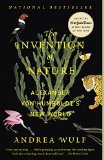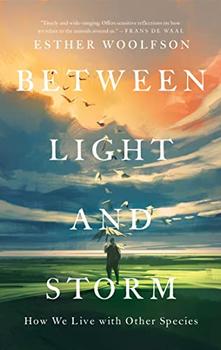Summary | Excerpt | Reviews | Beyond the book | Read-Alikes | Genres & Themes | Author Bio

Alexander von Humboldt's New World
by Andrea WulfThe acclaimed author of Founding Gardeners reveals the forgotten life of Alexander von Humboldt, the visionary German naturalist whose ideas changed the way we see the natural world - and in the process created modern environmentalism.
Alexander von Humboldt (1769–1859) was an intrepid explorer and the most famous scientist of his age. In North America, his name still graces four counties, thirteen towns, a river, parks, bays, lakes, and mountains. His restless life was packed with adventure and discovery, whether he was climbing the highest volcanoes in the world or racing through anthrax-infected Siberia or translating his research into bestselling publications that changed science and thinking. Among Humboldt's most revolutionary ideas was a radical vision of nature, that it is a complex and interconnected global force that does not exist for the use of humankind alone.
Now Andrea Wulf brings the man and his achievements back into focus: his daring expeditions and investigation of wild environments around the world and his discoveries of similarities between climate and vegetation zones on different continents. She also discusses his prediction of human-induced climate change, his remarkable ability to fashion poetic narrative out of scientific observation, and his relationships with iconic figures such as Simón Bolívar and Thomas Jefferson. Wulf examines how Humboldt's writings inspired other naturalists and poets such as Darwin, Wordsworth, and Goethe, and she makes the compelling case that it was Humboldt's influence that led John Muir to his ideas of natural preservation and that shaped Thoreau's Walden.
With this brilliantly researched and compellingly written book, Andrea Wulf shows the myriad fundamental ways in which Humboldt created our understanding of the natural world, and she champions a renewed interest in this vital and lost player in environmental history and science.
With almost a hundred pages of explanatory notes and a bibliography extensive enough to comprise a near-lifetime of reading for even avid readers, The Invention of Nature is a serious book about a seriously important figure. Even if it never really transcends standard biography, Wulf certainly makes her case, establishing the singular significance of a man whose work was etched in stone but whose name was written on the shifting sands of time...continued
Full Review
 (785 words)
(785 words)
(Reviewed by James Broderick).
Who would have thought that one frog could have such a huge impact on science?
As bizarre as it sounds, that was exactly the case. In the late eighteenth century, a scientist named Luigi Galvani performed an experiment on a frog, making a slight cut just beneath the frog's skin to expose nerve cells. When the scalpel came into contact with a metal hook holding down the body, sparks flew, and the legs of the frog twitched. His conclusion? Animal tissue is endowed with electricity. The scientific conclusion Galvani reached — and the remarkable widespread interest it engendered – led to a surge of interest, especially in the medical community, but also in the popular imagination.
 The idea that animal's bodies were vessels...
The idea that animal's bodies were vessels...

If you liked The Invention of Nature, try these:

by Esther Woolfson
Published 2022
A landmark examination of the fraught relationship between humans and animals, taking the reader from Genesis to climate change.

by Claire Cameron
Published 2018
From the author of The Bear, the enthralling story of two women separated by millennia, but linked by an epic journey that will transform them both.